初一情态动词讲解及练习附答案
初一初中语法英语情态动词讲解含答案
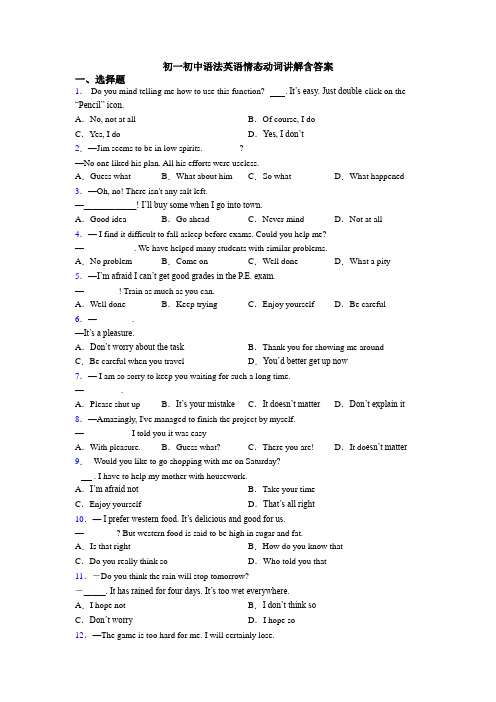
初一初中语法英语情态动词讲解含答案一、选择题1.-Do you mind telling me how to use this function? - . It’s easy. Just double-click on the “Pencil” icon.A.No, not at all B.Of course, I doC.Yes, I do D.Yes, I don’t2.—Jim seems to be in low spirits. ________?—No one liked his plan. All his efforts were useless.A.Guess what B.What about him C.So what D.What happened 3.—Oh, no! There isn't any salt left.—____________! I’ll buy some when I go into town.A.Good idea B.Go ahead C.Never mind D.Not at all 4.— I find it difficult to fall asleep before exams. Could you help me?— ___________. We have helped many students with similar problems.A.No problem B.Come on C.Well done D.What a pity 5.—I’m afraid I can’t get good grades in the P.E. exam.—________! Train as much as you can.A.Well done B.Keep trying C.Enjoy yourself D.Be careful 6.—________.—It’s a pleasure.A.Don’t worry about the task B.Thank you for showing me around C.Be careful when you travel D.You’d better get up now7.— I am so sorry to keep you waiting for such a long time.— ________.A.Please shut up B.It’s your mistake C.It doesn’t matter D.Don’t explain it 8.—Amazingly, I've managed to finish the project by myself.—___________I told you it was easyA.With pleasure. B.Guess what? C.There you are! D.It do esn’t matter 9.--Would you like to go shopping with me on Saturday?-- . I have to help my mother with housework.A.I’m afraid not B.Take your timeC.Enjoy yourself D.That’s all right10.—I prefer western food. It’s delicious and good for us.—_______ ? But western food is said to be high in sugar and fat.A.Is that right B.How do you know thatC.Do you really think so D.Who told you that11.-Do you think the rain will stop tomorrow?-_____. It has rained for four days. It’s too wet everywhere.A.I hope not B.I don’t think soC.Don’t worry D.I hope so12.—The game is too hard for me. I will certainly lose.—________. You should never say no before you try.A.Forget it! B.Come on! C.I’m sorry.D.Pardon me? 13.—Would you like a small or a large bowl of noodles? —_______. I’m very hungry. A.A small bowl B.A large bowl C.Yes, please D.No, thanks 14.—Can I look at the menu for a few more minutes before I decide?—Of course. ________, Sir.A.Make yourself at home B.Enjoy yourself C.It doesn’t matterD.Take your time15.—Would you please help me with my spoken English?—__________. First you should know practice makes perfect.A.That’s right B.No problem C.Quite well D.No, thanks 16.—TV says there will be a heavy rain tomorrow.—________. I planned to go climbing with my friend.A.Bad luck B.I hope so C.Good idea D.I don’t mind 17.—I missed the basketball game last Saturday because I had an exam.—________, but it will be repeated on TV.A.Take it easy B.You are lucky C.That’s wonderful D.Never mind 18.—Why not take your son to watch the new film A Little Red Flower?—__________.A.Good idea B.No problem C.Good luck D.No way 19.—Do you like cartoons or scary movies?—_______. They can cheer me up.A.Yes, I do B.No, I don't C.Cartoons D.Scary movies 20.—I’m sorry I didn’t make it to your birthday party last night.— ________ I know you are busy recently.A.Why not? B.Don’t mention it.C.No way. D.That’s all right. 21.—Excuse me, can you give me some water? The cup is empty.—________A.Go ahead. B.My pleasure C.At your service D.You’d better not. 22.—You seem so happy today, Jack.—________? I won the first prize in the singing competition yesterday.A.So what B.How come C.Guess what D.Why not 23.—Susan, will you please go and empty that drawer?— _________ ?A.What for B.What is it C.How is it D.How come 24.—I’m going hiking this afternoon. Would you like to go with me?—______, but I must finish my homework first.A.Sorry, I don’t B.That’s right C.I’d love to D.Not at all 25.— Could you please clean your room?—_________. I’ll do it at once.A.Yes, sure B.Sorry, I can’t C.It doesn’t matter D.Here you are 26.—Summer camping gives children the chance to live away from home.—________. It is always good to help children grow up.A.That’s true.B.Come this way. C.Let me have a look. D.I don’t think we agree.27.—Could you help me look after my baby ________ I am away?—________.A.as; With pleasure B.while; My pleasure C.as; That’s all right D.while; With pleasure28.—How would you like your soup?—________.A.Very delicious B.With some tomatoes and eggs, pleaseC.I like it very much D.No, thanks29.—Would you mind if I open the window?—_______.We need fresh air.A.Not at all B.Yes, of course C.You’d better not D.That’s all right 30.— Why will you take part in the charity walk? You are not good at running at all.— ________. I run to show that I can help others.A.Not exactly B.That’s not the point C.I can’t agree more D.It sounds like a pity 31.—Shall we go to the amusement park right away or the day after tomorrow?—________. Any time will do.A.Excuse me B.Have a good timeC.It’s up to you D.I’m afraid I can’t32.—How do you like coffee, Minnie?—It tastes very terrible. ________.A.I have no idea B.I don’t mind it C.I really can’t stand it D.I can’t afford it 33.— Do you think Steve will pass the exam this time?— ________! He spends most of his time playing games on the phone.A.Promise B.No way C.Well done D.No problem 34.—________!—Yes. It sounds gentle and relaxing.A.How good the vegetable soup is B.How exciting the storybook isC.What nice music Ann is playing D.What a beautiful flower Jim keeps 35.—How about buying that coat?—________. It’s too expensive. I can’t afford it.A.That sounds good B.No way C.Good idea D.What a pity 36.—I wonder if Tenny is doing well in her new school.—________. She is old enough to look after herself well.A.You’re welcome B.Good luck C.It’s a pity D.No need to worry 37.—Here’s your change.—________A.My pleasure. B.Thank you. C.With pleasure. D.No problem. 38.—I’ll be away on a business trip. Would you mind looking after my cat?—Not at all. ________.A.It’s my pleasure B.I’d rather not.C.I’d like it.D.With pleasure. 39.—Why don’t you join in a club to practise speaking English?—________.A.That’s a good idea B.Never mind C.Yes, please D.Thank you 40.—Thank you for helping to build hospitals during this special period.— ________ ! Many hands make light work.A.My pleasure B.All right C.Never mind D.None of my business41.— Would you mind my turning on the TV? The New Year concert has just begun.— ________. Just go ahead.A.Please don’t B.Better not C.Of course not D.I’m afraid not 42.—I prefer to chat online. I’ve got to know many friends on the Internet.—________. Few of them would become your real friends.A.I can’t agree more B.I’m pleased to know thatC.That’s for sure D.That’s not the case43.—Do you think you could finish this project without help?—________. This is not the first time for me.A.Take care B.Don’t worry C.Not exactly D.Hurry up 44.—We can invite Kate and Paul to Baohe Park with us.—________ I’ll give them a call right now.A.Why not? B.What for? C.What’s up?D.Are you kidding? 45.—Mum, Joe has broken a cup!—________. Accidents always happen.A.Pretty good B.Of course C.It doesn’t matter D.That depends 46.— The movie Lost in Russia sends a message about the importance of family.— ________. It reminds me of my parents.A.I hope so B.That’s all right C.You bet D.I don’t think so 47.— The dress I got is not the same color as that is shown online.—________? But if so, I promise we will send you another one.A.How come B.Who knows C.What for D.Why worry 48.— Are you feeling any better now after taking the medicine?—________. I’m feeling even worse.A.You got it B.Never mind C.Sorry to hear that D.Quite the opposite 49.—Another Friday! Let’s go to see the play tonight.—________ I will book the tickets online.A.My pleasure. B.That’s right.C.Why not? D.Never mind. 50.—Many people think women are better at cooking than men.—________. Most top chefs in the world are men.A.I agree B.I can’t agree more C.Not at all D.That’s not the case 【参考答案】***试卷处理标记,请不要删除1.A【解析】本题考查的是情景反应.根据意思可知答案为A解析:A【解析】本题考查的是情景反应.根据意思可知答案为A2.D【详解】句意:——吉姆似乎情绪低落。
初一英语情态动词推测用法练习题40题含答案解析

初一英语情态动词推测用法练习题40题含答案解析1.There must be a lot of students in the library. It's very quiet.must becan't bemight becould be答案解析:must be。
“must be”表示肯定的推测,意思是“一定是”。
图书馆很安静,通常情况下安静的地方可能有很多学生在学习,所以用“must be”比较合理。
“can't be”表示否定的推测,不符合题意。
“might be”和“could be”表示可能性较小的推测,没有“must be”肯定。
2.The boy in the classroom must be Tom. He is the only one who wears a blue shirt today.must becan't bemight becould be答案解析:must be。
题干中明确指出男孩是唯一穿蓝色衬衫的人,所以肯定是Tom,用“must be”。
“can't be”否定推测不符合。
“might be”和“could be”可能性小,不如“must be”确定。
3.There must be some books on the desk. I saw the teacher put them there.must becan't bemight becould be答案解析:must be。
看到老师把书放在桌子上了,所以肯定有书在桌子上,用“must be”。
“can't be”不对。
“might be”和“could be”表示不确定,这里已经确定看到老师放书了。
4.The girl who is singing must be Lily. She has a beautiful voice.must becan't bemight becould be答案解析:must be。
初一英语情态动词练习题40题含答案解析
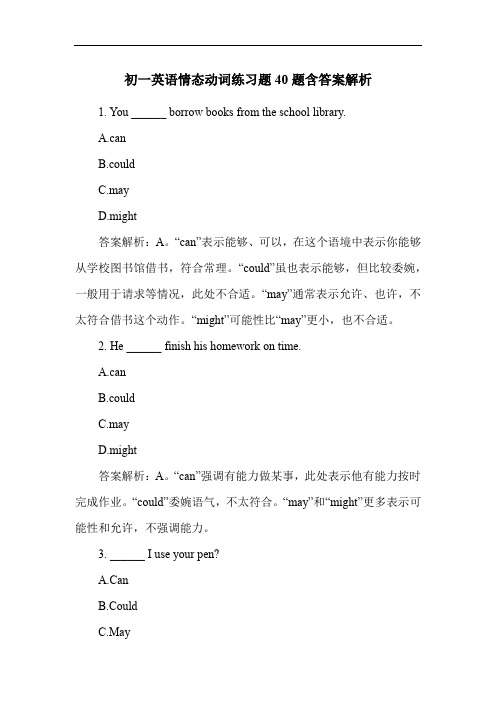
初一英语情态动词练习题40题含答案解析1. You ______ borrow books from the school library.A.canB.couldC.mayD.might答案解析:A。
“can”表示能够、可以,在这个语境中表示你能够从学校图书馆借书,符合常理。
“could”虽也表示能够,但比较委婉,一般用于请求等情况,此处不合适。
“may”通常表示允许、也许,不太符合借书这个动作。
“might”可能性比“may”更小,也不合适。
2. He ______ finish his homework on time.A.canB.couldC.mayD.might答案解析:A。
“can”强调有能力做某事,此处表示他有能力按时完成作业。
“could”委婉语气,不太符合。
“may”和“might”更多表示可能性和允许,不强调能力。
3. ______ I use your pen?A.CanB.CouldC.May答案解析:A 或C 都可以。
“Can I use your pen?”和“May I use your pen?”在请求别人允许时都可以用。
“could”和“might”语气更委婉,但不如“can”和“may”常用。
4. She ______ come to school early tomorrow.A.canB.couldC.mayD.might答案解析:C 或D。
“may”和“might”都表示可能性,此处表示她明天可能早点来学校。
“can”和“could”强调能力,不太符合语境。
5. We ______ listen to the teacher carefully in class.A.canB.couldC.mayD.might答案解析:A。
“can”表示能够、应该,在课堂上我们应该认真听老师讲课,符合语境。
“could”委婉语气,不太恰当。
“may”和“might”更多表示可能性和允许。
情态动词的用法(附练习及参考答案)
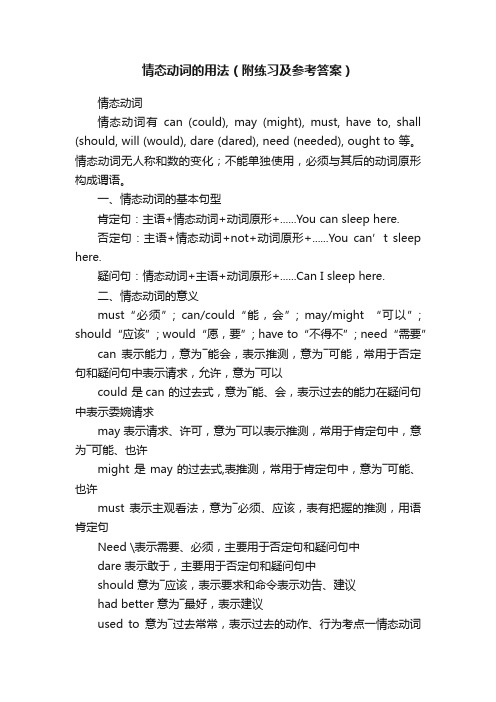
情态动词的用法(附练习及参考答案)情态动词情态动词有can (could), may (might), must, have to, shall (should, will (would), dare (dared), need (needed), ought to 等。
情态动词无人称和数的变化;不能单独使用,必须与其后的动词原形构成谓语。
一、情态动词的基本句型肯定句:主语+情态动词+动词原形+......You can sleep here.否定句:主语+情态动词+not+动词原形+......You can’t sleep here.疑问句:情态动词+主语+动词原形+......Can I sleep here.二、情态动词的意义must“必须”; can/could“能,会”; may/might “可以”; should“应该”; would“愿,要”; have to“不得不”; need“需要”can 表示能力,意为―能会,表示推测,意为―可能,常用于否定句和疑问句中表示请求,允许,意为―可以could 是can 的过去式,意为―能、会,表示过去的能力在疑问句中表示委婉请求may 表示请求、许可,意为―可以表示推测,常用于肯定句中,意为―可能、也许might 是may的过去式,表推测,常用于肯定句中,意为―可能、也许must 表示主观看法,意为―必须、应该,表有把握的推测,用语肯定句Need \表示需要、必须,主要用于否定句和疑问句中dare 表示敢于,主要用于否定句和疑问句中should 意为―应该,表示要求和命令表示劝告、建议had better 意为―最好,表示建议used to意为―过去常常,表示过去的动作、行为考点一情态动词情态动词有具体的词义,但也同助动词一样,需要与其他词语一起构成句子的谓语,另外情态动词没哟人称和数的变化,情态动词后必须跟动词原形。
三、情态动词的基本用法1. can 的用法(1)表示能力、许可、可能性。
初中英语情态动词专项练习(附答案解析)
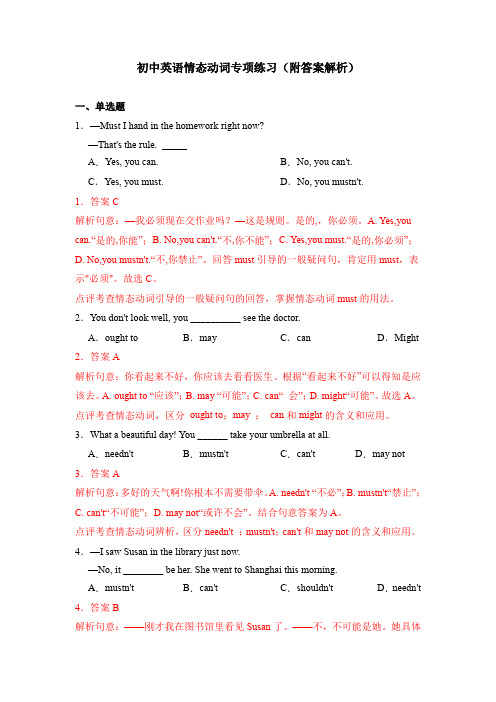
初中英语情态动词专项练习(附答案解析)一、单选题1.—Must I hand in the homework right now?—That's the rule.A.Yes, you can.B.No, you can't.C.Yes, you must.D.No, you mustn't.1.答案C解析句意:—我必须现在交作业吗?—这是规则。
是的,,你必须。
A. Yes,you can.“是的,你能”;B. No,you can't.“不,你不能”;C. Yes,you must.“是的,你必须”;D. No,you mustn't.“不,你禁止”。
回答must引导的一般疑问句,肯定用must,表示"必须"。
故选C。
点评考查情态动词引导的一般疑问句的回答,掌握情态动词must的用法。
2.You don't look well, you __________ see the doctor.A.ought to B.may C.can D.Might 2.答案A解析句意:你看起来不好,你应该去看看医生。
根据“看起来不好”可以得知是应该去。
A. ought to “应该”;B. may “可能”;C. can“ 会”;D. might“可能”。
故选A。
点评考查情态动词,区分ought to;may ;can和might的含义和应用。
3.What a beautiful day! You ______ take your umbrella at all.A.needn't B.mustn't C.can't D.may not 3.答案A解析句意:多好的天气啊!你根本不需要带伞。
A. needn't “不必”;B. mustn't“禁止”;C. can't“不可能”;D. may not“或许不会”。
修改名词:初一情态动词的详细解释及练习附答案
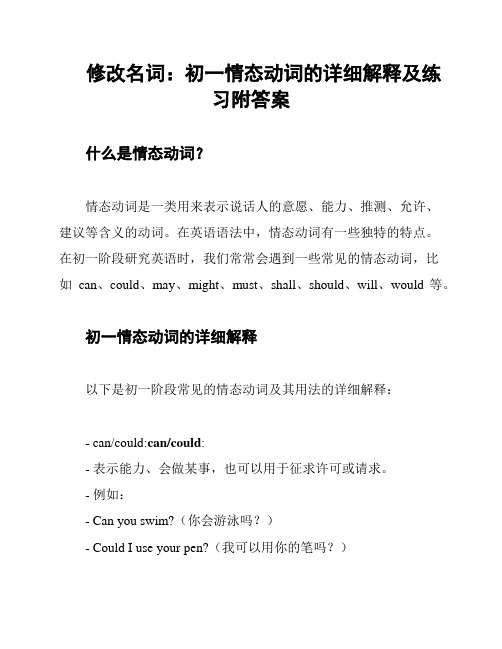
修改名词:初一情态动词的详细解释及练习附答案什么是情态动词?情态动词是一类用来表示说话人的意愿、能力、推测、允许、建议等含义的动词。
在英语语法中,情态动词有一些独特的特点。
在初一阶段研究英语时,我们常常会遇到一些常见的情态动词,比如can、could、may、might、must、shall、should、will、would等。
初一情态动词的详细解释以下是初一阶段常见的情态动词及其用法的详细解释:- can/could:can/could:- 表示能力、会做某事,也可以用于征求许可或请求。
- 例如:- Can you swim?(你会游泳吗?)- Could I use your pen?(我可以用你的笔吗?)- may/might:may/might:- 表示允许、许可,也可以用于推测或提出建议。
- 例如:- May I go to the restroom?(我可以去洗手间吗?)- He might be late for the meeting.(他可能会迟到会议。
)- must:must:- 表示必须、肯定,常用于表达强烈的推断、假设或建议。
- 例如:- You must finish your homework before playing.(玩之前你必须完成作业。
)- It must be cold outside.(外面肯定很冷。
)- shall/should:shall/should:- 表示建议、命令或预测。
- 例如:- Shall we go to the park?(我们去公园好吗?)- You should study hard for the test.(你应该为考试努力研究。
)- will/would:will/would:- 表示将来的意愿、决定或假设。
- 例如:- I will help you with your project.(我会帮你完成项目。
)- If I were you, I would apologize.(如果我是你,我会道歉。
初一上册完整版初中英语情态动词讲义全含答案

初一上册完整版初中英语情态动词讲义全含答案一、选择题1.— Could you please clean your room?—_________. I’ll do it at once.A.Yes, sure B.Sorry, I can’t C.It doesn’t matter D.Here you are 2.—________. Where’s the nearest supermarket?—Oh, it’s about 300 meters away, next to a park.A.Thank you B.Excuse me C.Come on D.That’s OK3.—I was too busy to see the singing competition.—________. I have to say it’s really wonderful.A.No problem B.You are welcome C.Not at all D.It’s a pity 4.—I’m afraid I can’t get good grades in the P.E. exam.—________! Train as much as you can.A.Well done B.Keep trying C.Enjoy yourself D.Be careful 5.—________.—It’s a pleasure.A.Don’t worry about the task B.Thank you for showing me aroundC.Be careful when you travel D.You’d better get up now6.— I though t I’d try to repair the car myself.— __________ ! You know nothing about the car.A.No way B.You can’t be serious C.I couldn’t agree more D.Don’t change a thing7.– Would you like me to lock the door?– _______A.Yes, I’d like to.B.It’s a pleasure.C.Yes, please. D.It doesn’t matter. 8.—Amazingly, I've managed to finish the project by myself.—___________I told you it was easyA.With pleasure. B.Guess what? C.There you are! D.It doesn’t matter 9.--Would you like to go shopping with me on Saturday?-- . I have to help my mother with housework.A.I’m afraid not B.Take your timeC.Enjoy yourself D.That’s all right10.—I’m sorry. That wasn’t of much help.— ________. In fact, it was most helpful.A.Thanks anyway B.It doesn’t matter C.Of course not D.Sure it was 11.—It’s been a wonderful party. Thank you very much?—- ________________.A.With pleasure B.No , thanks C.It’s OK D.I’m glad you enjoyed it .12.—Oh, no! There isn't any salt left.—____________! I’ll buy some when I go into town.A.Good idea B.Go ahead C.Never mind D.Not at all13.--Would you mind opening the window? It’s too hot.--__________.A.Sorry. I wouldn’t.B.No, of course not.C.It doesn’t matter.D.Yes, please.14.—I plan to find a part-time job in the coming summer holiday.—________ It will be a totally different experience.A.See you later. B.You’d better not.C.I’m sorry to know that.D.That sounds like fun.15.— What do you think of the movie Mr. Bea ?—____. It’s very funny.A.I can’t stand it .B.I don’t mind it C.I love it. D.I hate it. 16.— Shall we go to Nanjing Green Expo Park to enjoy the beautiful flowers this afternoon?—________. Let’s go there by bike.A.I think so B.That’s all right C.My pleasure D.Sounds great 17.—I have got a new job as a presenter in the Wenzhou Radio Station!—________.A.Come on B.Good idea C.Congratulations D.All right 18.—TV says there will be a heavy rain tomorrow.—________. I planned to go climbing with my friend.A.Bad luck B.I hope so C.Good idea D.I don’t mind 19.—Sir, this is your order, two chicken hamburgers and a cup of coffee. ________—I’ll have them here.A.For here or to go? B.Something to drink? C.Anything else? D.Is that OK? 20.—Why not take your son to watch the new film A Little Red Flower?—__________.A.Good idea B.No problem C.Good luck D.No way 21.—Do you like cartoons or scary movies?—_______. They can cheer me up.A.Yes, I do B.No, I don't C.Cartoons D.Scary movies 22.—I’m sorry I didn’t make it to your birthday party last night.— ________ I know you are busy recently.A.Why not? B.Don’t mention it.C.No way. D.That’s all right. 23.—I’m going hiking this afternoon. Would you like to go with me?—______, but I must finish my homework first.A.Sorry, I don’t B.That’s right C.I’d love to D.Not at all 24.—Jim seems to be in low spirits. ________?—No one liked his plan. All his efforts were useless.A.Guess what B.What about him C.So what D.What happened 25.—I prefer western food. It’s delicious and good for us.—_______ ? But western food is said to be high in sugar and fat.A.Is that right B.How do you know thatC.Do you really think so D.Who told you that26.—Summer camping gives children the chance to live away from home.—________. It is always good to help children grow up.A.That’s true.B.Come this way. C.Let me have a look. D.I don’t think we agree.27.—Can you tell me how to get to the park?—________—Thank you all the same.A.Show me the map, please.B.Certainly. It’s opposite the museum.C.Sorry, I don’t know. I’m a stranger here.D.Sure. Turn right and go along Rock Road.28.—Would you mind if I open the window?—_______.We need fresh air.A.Not at all B.Yes, of course C.You’d better not D.That’s all right 29.—Only those who have a lot in common can get along well.—________ Opposites sometimes attract.A.I think so. B.I don’t think so.C.I don’t care.D.I hope so. 30.—Only those who have a lot in common can get along well.—________. Opposites sometimes attract.A.I think so B.I don’t think so C.I don’t care D.I hope so 31.— Why will you take part in the charity walk? You are not good at running at all.— ________. I run to show that I can help others.A.Not exactly B.That’s not the point C.I can’t agree more D.It sounds like a pity 32.—Shall we go to the amusement park right away or the day after tomorrow?—________. Any time will do.A.Excuse me B.Have a good timeC.It’s up to you D.I’m afraid I can’t33.—Oh, my love, you say you have ordered a dozen cups of bubble tea (奶茶)?—________A.Agree. B.Forget it. C.I really do. D.Are you kidding me? 34.— May I have a look at the newspaper China Daily?— Certainly. ________A.Thank you. B.It’s a pity.C.Here you are. D.I’d like to. 35.—Hi, everybody! Here is the music.—________. Let’s dance to the music.A.That’s no good B.Here we go C.That’s a shame D.Have a good time 36.— Mike, are you ready for the coming final exam?— ________. I have prepared it for weeks.A.You bet B.No deal C.Bad luck D.Have fun 37.— I find it difficult to fall asleep before exams. Could you help me?— ___________. We have helped many students with similar problems.A.No problem B.Come on C.Well done D.What a pity 38.—I’ll have a chemistry exam tomorrow.—________!A.Well done B.Congratulations C.You’re welcome D.Good luck 39.—Why don’t you join in a club to practise speaking English?—________.A.That’s a good idea B.Never mind C.Yes, please D.Thank you 40.—Thank you for helping to build hospitals during this special period.— ________ ! Many hands make light work.A.My pleasure B.All right C.Never mind D.None of my business41.— Would you mind my turning on the TV? The New Year concert has just begun.— ________. Just go ahead.A.Please don’t B.Better not C.Of course not D.I’m afraid not 42.—I prefer to chat online. I’ve got to know many friends on the Internet.—________. Few of them would become your real friends.A.I can’t agree more B.I’m pleased to know thatC.That’s for sure D.That’s not the case43.—I visited the Purple Mountain Observatory by myself last Saturday.—________ Why didn’t you tell me earlier?A.You did? B.I hope not. C.Have a good time. D.I can’t believe it. 44.—Our school football team has won the first prize in the match!—________A.Have a good time. B.Nice work. C.Never mind. D.Good luck. 45.—We’ll study in different schools next term. I hope you’ll enjoy your time in the new school!—________A.I’ll take your advice. B.The same to you. C.Congratulations!D.It doesn’t matter.46.—Michael was late for Mr. Smith’s chemistry class this morning.—________? As far as I know, he never came late to class.A.So what B.Why not C.How come D.Who cares 47.—Can I look at the menu for a few more minutes before I decide?—Of course. ________, Sir.A.Make yourself at home B.Enjoy yourself C.It doesn’t matterD.Take your time48.—I just got a message from Ms. Yang and she said she would come to our meeting this afternoon.— She always has good ideas.A.Why not? B.What a pity! C.Time is up. D.That’ll be very nice.49.—Don’t forget to keep safe distance (距离) at least one meter, Mike!—________A.Sorry, I won’t.B.No, I can’t do it. C.Not at all. D.I hope not. 50.—Many people think women are better at cooking than men.—________. Most top chefs in the world are men.A.I agree B.I can’t agree more C.Not at all D.That’s not the case 【参考答案】***试卷处理标记,请不要删除一、选择题1.A【解析】本题考查的是情景反应,要用客气婉转的回答方式。
情态动词讲解及练习(含答案)
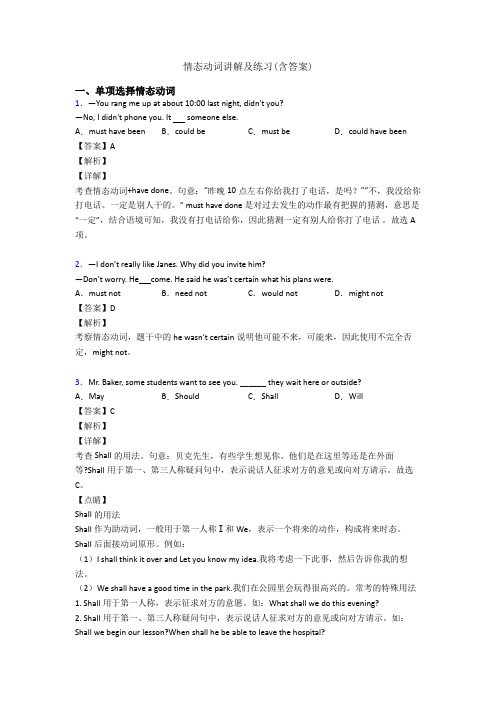
情态动词讲解及练习(含答案)一、单项选择情态动词1.—You rang me up at about 10:00 last night, didn't you?—No, I didn't phone you. It someone else.A.must have been B.could be C.must be D.could have been 【答案】A【解析】【详解】考查情态动词+have done。
句意:“昨晚10点左右你给我打了电话,是吗?”“不,我没给你打电话。
一定是别人干的。
” must have done 是对过去发生的动作最有把握的猜测,意思是“一定”,结合语境可知,我没有打电话给你,因此猜测一定有别人给你打了电话。
故选A 项。
2.—I don’t really like Janes. Why did you invite him?—Don’t worry. He come. He said he was’t certain what his plans were.A.must not B.need not C.would not D.might not【答案】D【解析】考察情态动词,题干中的he wasn’t certain说明他可能不来,可能来,因此使用不完全否定,might not。
3.Mr. Baker, some students want to see you. ______ they wait here or outside?A.May B.Should C.Shall D.Will【答案】C【解析】【详解】考查Shall的用法。
句意:贝克先生,有些学生想见你。
他们是在这里等还是在外面等?Shall用于第一、第三人称疑问句中,表示说话人征求对方的意见或向对方请示。
故选C。
【点睛】Shall的用法Shall作为助动词,一般用于第一人称Ⅰ和We,表示一个将来的动作,构成将来时态。
初一英语情态动词试题答案及解析
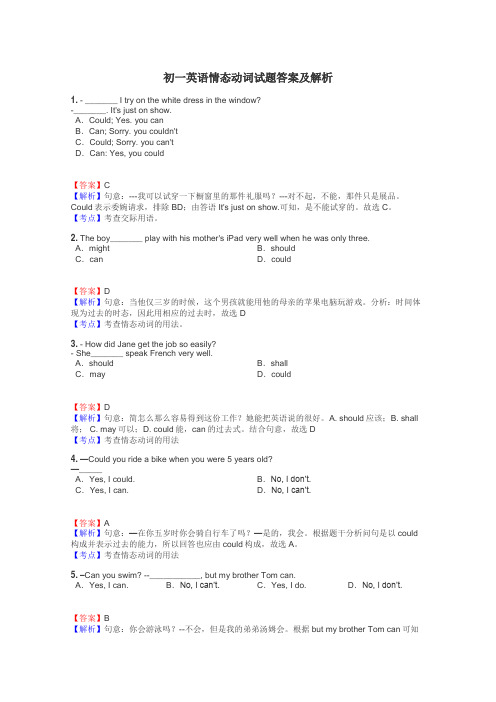
初一英语情态动词试题答案及解析1. - _______ I try on the white dress in the window?-_______. It's just on show.A.Could; Yes. you canB.Can; Sorry. you couldn'tC.Could; Sorry. you can'tD.Can: Yes, you could【答案】C【解析】句意:---我可以试穿一下橱窗里的那件礼服吗?---对不起,不能,那件只是展品。
Could表示委婉请求,排除BD;由答语It's just on show.可知,是不能试穿的。
故选C。
【考点】考查交际用语。
2. The boy_______ play with his mother's iPad very well when he was only three.A.might B.shouldC.can D.could【答案】D【解析】句意:当他仅三岁的时候,这个男孩就能用他的母亲的苹果电脑玩游戏。
分析:时间体现为过去的时态,因此用相应的过去时,故选 D【考点】考查情态动词的用法。
3. - How did Jane get the job so easily?- She_______ speak French very well.A.should B.shallC.may D.could【答案】D【解析】句意:简怎么那么容易得到这份工作?她能把英语说的很好。
A. should应该;B. shall 将; C. may可以;D. could能,can的过去式。
结合句意,故选D【考点】考查情态动词的用法4.—Could you ride a bike when you were 5 years old?—_____A.Yes, I could.B.No, I don’t.C.Yes, I can.D.No, I can’t.【答案】A【解析】句意:—在你五岁时你会骑自行车了吗?—是的,我会。
七年级英语英语情态动词附答案附解析
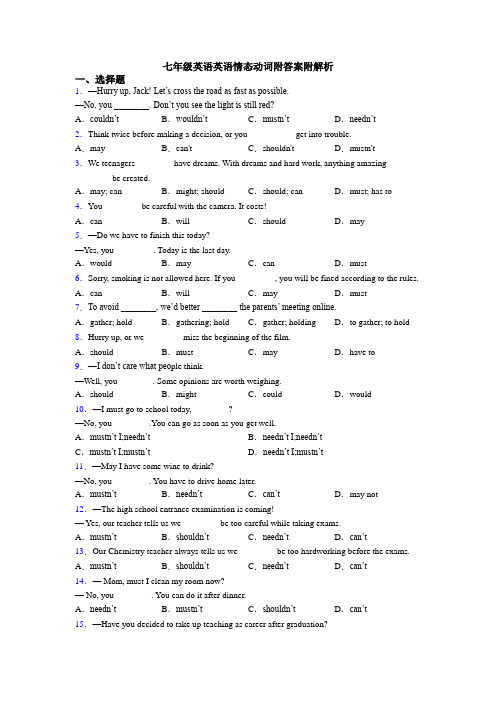
七年级英语英语情态动词附答案附解析一、选择题1.—Hurry up, Jack! Let’s cross the road as fast as possible.—No, you ________. Don’t you see the light is still red?A.couldn’t B.wouldn’t C.mustn’t D.needn’t2.Think twice before making a decision, or you __________ get into trouble.A.may B.can't C.shouldn't D.mustn't3.We teenagers ________ have dreams. With dreams and hard work, anything amazing________ be created.A.may; can B.might; should C.should; can D.must; has to 4.You ________ be careful with the camera. It costs!A.can B.will C.should D.may5.—Do we have to finish this today?—Yes, you ________ . Today is the last day.A.would B.may C.can D.must6.Sorry, smoking is not allowed here. If you ________ , you will be fined according to the rules. A.can B.will C.may D.must7.To avoid ________, we’d better ________ the parents’ meeting online.A.gather; hold B.gathering; hold C.gather; holding D.to gather; to hold 8.Hurry up, or we ________ miss the beginning of the film.A.should B.must C.may D.have to9.—I don’t care what peo ple think.—Well, you _______ . Some opinions are worth weighing.A.should B.might C.could D.would10.—I must go to school today, ________?—No, you ________.You can go as soon as you get well.A.mustn’t I;needn’t B.needn’t I;needn’tC.mustn’t I;mustn’t D.needn’t I;mustn’t11.—May I have some wine to drink?—No, you ________. You have to drive home later.A.mustn’t B.needn’t C.can’t D.may not 12.—The high school entrance examination is coming!— Yes, our teacher tells us we ________ be too careful while taking exams.A.mustn’t B.shouldn’t C.needn’t D.can’t13.Our Chemistry teacher always tells us we ________ be too hardworking before the exams. A.mustn’t B.shouldn’t C.needn’t D.can’t14.— Mom, must I clean my room now?— No, you ________. You can do it after dinner.A.needn’t B.mustn’t C.shouldn’t D.can’t 15.—Have you decided to take up teaching as career after graduation?—I ________ go abroad for further education instead. But it depends.A.must B.should C.may D.shall16.The boy is very brave.I ________ he ________ the tall tree.A.dare say; dares to climbB.dare to say; dare climbingC.dare saying; dares climbD.dare to say; dares climbed17.---Will you be back early this evening?---Yes, but I ________ be a little late. Our boss sometimes has extra work for us.A.may B.must C.need D.will 18.—Ready? Let’s get started, Martin.— Swimming? I just ________ get used to it in winter.A.can’t B.needn’t C.mustn’t D.shouldn’t 19.—Will your mother be at home this Saturday?—Hard to say. She _______go to the countryside to see my grandparents.A.must B.may C.can D.would20.You ________ require others to do with the problem like you. Everyone has his own way. A.mustn’t B.needn’t C.may not D.shouldn’t 21.When people are waiting at the zebra crossing, cars and buses ________ wait and let them go first.A.must B.may C.can D.need22.— Listen! Tom ________ be listening to the music while doing his homework.—Let’s go upstairs to remind him to turn it off.A.should B.could C.would D.must23.—Must I finish all my homework today, Mum?—No, you ________, my dear. You can finish some tomorrow if you like.A.needn’t B.shouldn’t C.can’t D.mustn’t24.We've discussed every detail of this plan and have got everything ready. But still something ________ go wrong. We still have to be very careful.A.must B.should C.would D.may25.—Suzy described every detail of the accident just now.—Her memory ________ be completely back.A.shall B.need C.must D.could26.Never throw objects from the building. Even a small object ________ cause serious injuries, or death, when dropped from a great height.A.must B.should C.may D.need27.—Will Jim come to Yangzhou for a holiday?—He ________come and it depends on how much homework he will have.A.may B.should C.must D.need28.—In China, many parents complain that their children have to stay up late to do thehomework.—Don’t worry. The government has realized the problem. I’m sure there ________ be good news soon.A.can B.should C.need D.must29.You ________ drive after drinking alcohol(酒). It’s agains t the law.A.mustn’t B.needn’t C.couldn’t D.wouldn’t30.You ________ pay too much attention to protecting yourself if you plan to go abroad. A.mustn’t B.can’t C.shouldn’t D.needn’t 31.—What is that young lady’s job?—She ________ be a nurse, I’m not sure.A.must B.may C.need D.would32.—Will dad arrive home at 6 o’clock to have dinner with us this evening?— I think he will, but he ________ not. Sometimes he works extra hours.A.can B.must C.need D.may 33.—Seventy dollars for such a dress! You ________ be joking!—I’m serious. It’s made of silk from Hangzhou.A.must B.need C.will D.can34.—Must we stop the Japanese government discharging nuclear waste water (排放核污水) into the Pacific Ocean?—________. Because everyone should protect our earth and it is bad ________ us to eat the polluted seafood and drink the waste water.A.Yes, we can; of B.No, we mustn’t; of C.Yes, we must; for D.No, we needn’t; for 35.Cars ________ give way to walkers on some roads in Binhai, or the drivers will be fined. A.may B.will C.can D.must36.You’ve got an A in the maths test again. You ________ be good at it.A.can B.may C.must D.should 37.—How beautiful the winter jasmines (迎春花) are!—Yes. These golden-yellow flowers ________ be widely seen in my city in March.A.must B.can C.would D.should38.— What do you think of the show yesterday?— Some of them were really good but others ________ be better.A.will B.must C.need D.can 39.—Who’s the man over there? Is that Mr. Black?—It ________ be him. Mr. Black is much taller than that man.A.may B.must C.can’t D.mustn’t40.— Is the boy over there Tom? He often wears a jacket like that.— It _______ be him. He is absent from school today.A.needn’t B.shouldn’t C.mustn’t D.can’t【参考答案】一、选择题解析:C【详解】句意:——快点,杰克!让那个我们尽快地过马路。
初一英语情态动词试题答案及解析
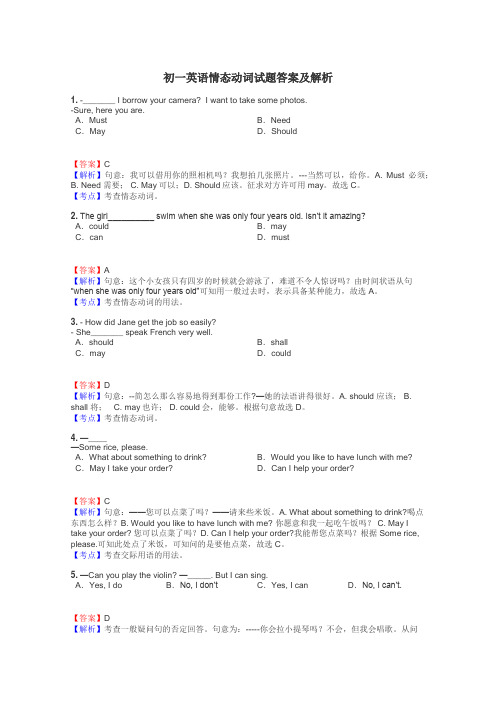
初一英语情态动词试题答案及解析1. -_______ I borrow your camera? I want to take some photos.-Sure, here you are.A.Must B.NeedC.May D.Should【答案】C【解析】句意:我可以借用你的照相机吗?我想拍几张照片。
---当然可以,给你。
A. Must必须;B. Need 需要;C. May可以;D. Should应该。
征求对方许可用may。
故选C。
【考点】考查情态动词。
2.The girl__________ swim when she was only four years old. Isn’t it amazing?A.could B.mayC.can D.must【答案】A【解析】句意:这个小女孩只有四岁的时候就会游泳了,难道不令人惊讶吗?由时间状语从句“when she was only four years old”可知用一般过去时,表示具备某种能力,故选A。
【考点】考查情态动词的用法。
3. - How did Jane get the job so easily?- She_______ speak French very well.A.should B.shallC.may D.could【答案】D【解析】句意:--简怎么那么容易地得到那份工作?—她的法语讲得很好。
A. should 应该; B. shall 将; C. may也许; D. could会,能够。
根据句意故选D。
【考点】考查情态动词。
4.—____—Some rice, please.A.What about something to drink?B.Would you like to have lunch with me? C.May I take your order?D.Can I help your order?【答案】C【解析】句意:——您可以点菜了吗?——请来些米饭。
初中英语情态动词详细用法归纳(含练习及答案)
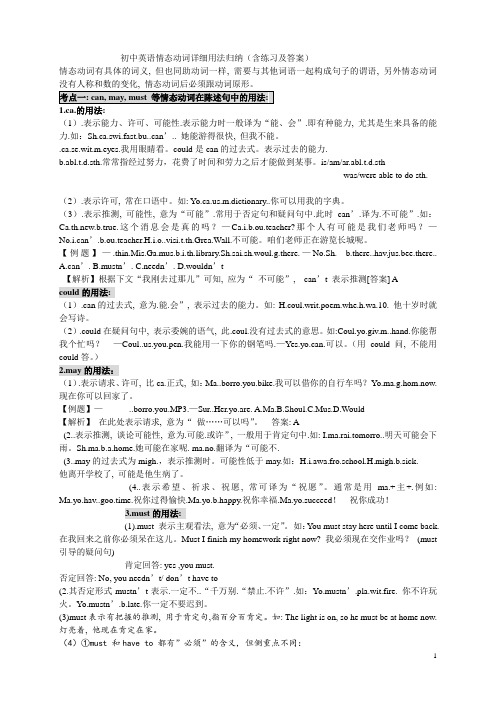
初中英语情态动词详细用法归纳(含练习及答案)情态动词有具体的词义, 但也同助动词一样, 需要与其他词语一起构成句子的谓语, 另外情态动词没有人称和数的变化, 情态动词后必须跟动词原形。
1.ca.的用法:(1).表示能力、许可、可能性.表示能力时一般译为“能、会”.即有种能力, 尤其是生来具备的能力.如:Sh.ca.swi.fast.bu..can’.. 她能游得很快, 但我不能。
.ca.se.wit.m.eyes.我用眼睛看。
could是can的过去式。
表示过去的能力.b.abl.t.d.sth.常常指经过努力,花费了时间和劳力之后才能做到某事。
is/am/ar.abl.t.d.sthwas/were able to do sth.(2).表示许可, 常在口语中。
如: .m.dictionary..你可以用我的字典。
(3).表示推测, 可能性, 意为“可能”.常用于否定句和疑问句中.此时can’.译为.不可能”.如:Ca.th.new.b.true.这个消息会是真的吗?—Ca.i.b.ou.teacher?那个人有可能是我们老师吗?—No.i.can’.b.ou.teacher.H.i.o..visi.t.th.Grea.Wall.不可能。
咱们老师正在游览长城呢。
【例题】—.thin.Mis.Ga.mus.b.i.th.library.Sh.sai.sh.woul.g.there.—No.Sh.__b.there..hav.jus.bee.there..A.can’.B.mustn’.C.needn’.D.wouldn’t【解析】根据下文“我刚去过那儿”可知, 应为“不可能”, can’t 表示推测[答案] Acould的用法:(1).can的过去式, 意为.能.会”, 表示过去的能力。
如: H.coul.writ.poem.whe.h.wa.10. 他十岁时就会写诗。
(2).could在疑问句中, 表示委婉的语气, 此.coul.没有过去式的意思。
七年级(完整版)英语情态动词练习题及答案含解析
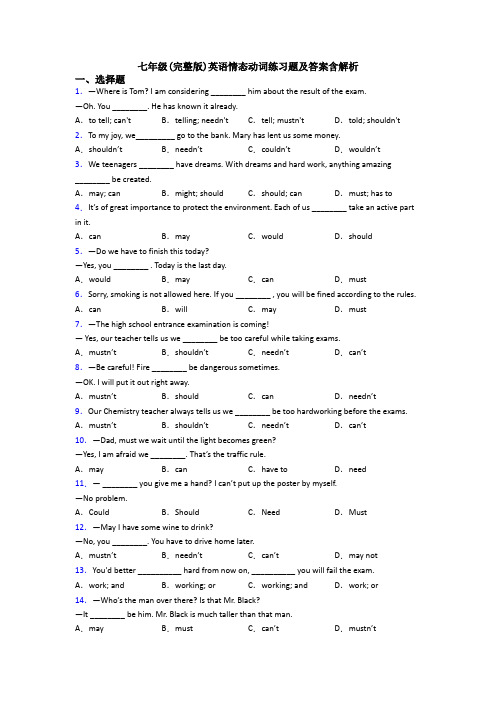
七年级(完整版)英语情态动词练习题及答案含解析一、选择题1.—Where is Tom? I am considering ________ him about the result of the exam.—Oh. You ________. He has known it already.A.to tell; can't B.telling; needn't C.tell; mustn't D.told; shouldn't 2.To my joy, we_________ go to the bank. Mary has lent us some money.A.shouldn’t B.needn’t C.couldn’t D.wouldn’t3.We teenagers ________ have dreams. With dreams and hard work, anything amazing________ be created.A.may; can B.might; should C.should; can D.must; has to 4.It’s of great imp ortance to protect the environment. Each of us ________ take an active part in it.A.can B.may C.would D.should5.—Do we have to finish this today?—Yes, you ________ . Today is the last day.A.would B.may C.can D.must 6.Sorry, smoking is not allowed here. If you ________ , you will be fined according to the rules. A.can B.will C.may D.must7.—The high school entrance examination is coming!— Yes, our teacher tells us we ________ be too careful while taking exams.A.mustn’t B.shouldn’t C.needn’t D.can’t8.—Be careful! Fire ________ be dangerous sometimes.—OK. I will put it out right away.A.mustn’t B.should C.can D.needn’t9.Our Chemistry teacher always tells us we ________ be too hardworking before the exams. A.mustn’t B.shouldn’t C.needn’t D.can’t 10.—Dad, must we wait until the light becomes green?—Yes, I am afraid we ________. That’s the traffic rule.A.may B.can C.have to D.need11.—________ you give me a hand? I can’t put up the poster by myself.—No problem.A.Could B.Should C.Need D.Must 12.—May I have some wine to drink?—No, you ________. You have to drive home later.A.mustn’t B.needn’t C.can’t D.may not 13.You'd better __________ hard from now on, __________ you will fail the exam. A.work; and B.working; or C.working; and D.work; or 14.—Who’s the man over there? Is that Mr. Black?—It ________ be him. Mr. Black is much taller than that man.A.may B.must C.can’t D.mustn’t15.— Mom, must I clean my room now?— No, you ________. You can do it after dinner.A.needn’t B.mustn’t C.shouldn’t D.can’t16.It’s amazing that the pen ________turn voice into text with few mistakes.A.can B.must C.may D.need17.— Zoe, what do you think is the greatest advantage of shopping online?— At least I ______ spend much time going from shop to shop.A.shouldn’t B.can’t C.needn’t D.mustn’t 18.Please don't make so much noise. I ________ hear the speaker very well.A.needn't B.can't C.shouldn't D.mustn't 19.We’ve discussed every detail of this plan and have got everything ready. But still something __________ go wrong. We still have to be very careful.A.must B.should C.would D.may20.You ______ pay too much attention to your pronunciation, as it is so important in the oral (口头的) test.A.shouldn’t B.mustn’t C.can’t D.needn’t 21.—Shall we go camping this summer holiday?—Nothing________be better.A.should B.could C.must D.may 22.—Would you please________in that way? That’s not safe!—Sorry. I won’t do it any more.A.not driving B.not to drive C.no driving D.not drive 23.Think twice before making a decision, or you __________ get into trouble.A.may B.can't C.shouldn't D.mustn't 24.Don’t cross the road until the traffic lights turn green. A car_______hit you.A.need B.may C.should D.must25.— Is Lang Lang going to perform at Art Center this Friday?— Yes. It ________ be him. He has been here for three days.A.might B.must C.mustn’t D.may26.—Will Jim come to Yangzhou for a holiday?—He ________come and it depends on how much homework he will have.A.may B.should C.must D.need27.Hurry up, or we ________ miss the beginning of the film.A.should B.must C.may D.have to28.—I must go to school today, ________?—No, you ________.You can go as soon as you get well.A.mustn’t I;needn’t B.needn’t I;needn’tC.mustn’t I;mustn’t D.needn’t I;mustn’t29.—How do you like my new dress?—Well, if I ________ say, it is not suitable for you.A.may B.must C.have to D.should30.— Excuse me, could you tell me where the Nanjing Brocade Museum is?—Go along this road for five minutes. You ________ miss it. It’s a huge building.A.mustn’t B.can’t C.ne edn’t D.shouldn’t 31.—Must the children leave at six tomorrow morning?—No, they _______. They can have more time to get ready for the trip.A.can’t B.needn’t C.mustn’t D.may not32.A hard-working man ________ become a great scientist, but a great scientist ________ be a hard-working man.A.can’t; can B.may not; must C.can’t; must D.may not; can 33.You _________ smoke here! Look at the sign. It says "No smoking".A.needn't B.mustn't C.can D.may34.—Must I finish all my homework today, Mum?—No, you ________, my dear. You can finish some tomorrow if you like.A.needn’t B.shouldn’t C.can’t D.mustn’t35.We've discussed every detail of this plan and have got everything ready. But still something ________ go wrong. We still have to be very careful.A.must B.should C.would D.may 36.—Suzy described every detail of the accident just now.—Her memory ________ be completely back.A.shall B.need C.must D.could37.You ________ drive after drinking alcohol(酒). It’s against the law.A.mustn’t B.needn’t C.couldn’t D.wouldn’t 38.— Mum, why do I have to wash hands so many times a day?—You ________ be too careful, for your health.A.can’t B.mustn’t C.may not D.needn’t39.—Is it really necessary for me to go shopping with a mask on?—I’m afraid you ________ in public. It is not only to protect yourself but also to protect others. A.must B.should C.can D.need40.I think all the students love the weekends because, to them, they ________ get up early on Saturdays or Sundays.A.mustn’t B.don’t need C.needn’t D.can’t41.—Is it usually warm in Yancheng in May?—Yes. But it _______ be rather cold sometimes.A.must B.should C.would D.can42.You ________ pay too much attention to protecting yourself if you plan to go abroad. A.mustn’t B.can’t C.shouldn’t D.needn’t 43.—Shall I tell him the change of the time right now?—I’m afraid you ________, otherwise he will be late for the meeting.A.can B.may C.must D.need44.Cars ________ give way to walkers on some roads in Binhai, or the drivers will be fined. A.may B.will C.can D.must 45.Sometimes smiles ________ be false, hiding other feelings like anger, fear or worry. A.should B.would C.must D.can46.— The sandstorm in Beijing is so serious this year.— Yes, I wonder when we ________ worry about the air we breathe.A.can’t B.mustn’t C.needn’t D.shouldn’t 47.—Could you tell me how to renew the library books?—With pleasure. You ________ come to our desk every time. It’s easier to renew them online. A.can’t B.mustn’t C.needn’t D.shouldn’t 48.For the safety of the passengers, objects like guns ________ be carried on board. A.may not B.needn’t C.might not D.mustn’t 49.—How beautiful the winter jasmines (迎春花) are!—Yes. These golden-yellow flowers ________ be widely seen in my city in March.A.must B.can C.would D.should 50.Most young people like shopping online because they ________ spend much time going from shop to shop.A.needn’t B.can’t C.mustn’t D.shouldn’t【参考答案】***试卷处理标记,请不要删除一、选择题1.B解析:B【详解】句意:——汤姆在哪里?我正在考虑告诉他考试的结果。
初一情态动词讲解及练习附答案

(could), may (might), must, have to, shall (should, will (would), dare (dared), need (needed), ought to等。
情态动词无人称和数的变化;不能单独使用,必须与其后的动词原形构成谓语一、can, could1) 表示能力(体力、知识、技能)。
Can you lift this heavy box?(体力)Mary can speak three languages.(知识)Can you skate?(技能)此时可用be able to代替。
Can只有一般现在时和一般过去式;而be able to则有更多的时态。
I’ll not be able to come this afternoon.当表示“经过努力才得以做成功某事”时应用be able to,不能用Can。
如:He was able to go to the party yesterday evening in spite of the heavy rain.2) 表示请求和允许。
-----Can I go now? ----- Yes, you can. / No, you can’t.此时可与may互换。
在疑问句中还可用could, might代替,不是过去式,只是语气更委婉,不能用于肯定句和答语中。
---- Could I come to see you tomorrow? ---- Yes, you can. ( No, I’m afraid not. )3) 表示客观可能性(客观原因形成的能力)。
They’ve changed the timetable, so we can go by bus instead. This hall can hold 500 people at least.4) 表示推测(惊讶、怀疑、不相信的态度),用于疑问句、否定句和感叹句中。
初一英语情态动词试题答案及解析

初一英语情态动词试题答案及解析1. You afraid of doing homework. You know, it’s easy. Just be careful.A.don’t have to B.have to beC.don’t have D.don’t have to be【答案】D【解析】根据下文,你知道,这很简单。
只要小心就行了。
可知前文指的是,你不必害怕做作业。
故选D。
【考点】考查动词的用法2. The boy_______ play with his mother's iPad very well when he was only three.A.might B.shouldC.can D.could【答案】D【解析】句意:当他仅三岁的时候,这个男孩就能用他的母亲的苹果电脑玩游戏。
分析:时间体现为过去的时态,因此用相应的过去时,故选 D【考点】考查情态动词的用法。
3. -_______ I borrow your camera? I want to take some photos.-Sure, here you are.A.Must B.NeedC.May D.Should【答案】C【解析】句意:我可以借用你的照相机吗?我想拍几张照片。
---当然可以,给你。
A. Must必须;B. Need 需要;C. May可以;D. Should应该。
征求对方许可用may。
故选C。
【考点】考查情态动词。
4. - How did Jane get the job so easily?- She_______ speak French very well.A.should B.shallC.may D.could【答案】D【解析】句意:--简怎么那么容易地得到那份工作?—她的法语讲得很好。
A. should 应该; B. shall 将; C. may也许; D. could会,能够。
初一上册英语情态动词(完整版)及答案

初一上册英语情态动词(完整版)及答案一、选择题1.—It’s been a wonderful party. Thank you very much?—- ________________.A.With pleasure B.No , thanks C.It’s OK D.I’m glad you enjoyed it .2.—Are you going to offer some masks and alcohol wet wipes (酒精湿巾) to the people in the village?—________ They are in great need of these things.A.What a shame! B.Why not? C.Why me? D.What's wrong? 3.—I’m afraid I can’t find the key to the car.—______. I’ll wait for you. We have enough time.A.Hurry up B.All rightC.It is up to you D.Hold your horses4.—Here’s your change.—________A.My pleasure. B.Thank you. C.With pleasure. D.No problem. 5.—Our family will go to Hangzhou for a holiday this summer.—________.A.Well done B.I am glad to hear thatC.Best wishes to you D.Have fun6.—I plan to find a part-time job in the coming summer holiday.—________ It will be a totally different experience.A.See you later. B.You’d better not.C.I’m sorry to know that.D.That sounds like fun.7.— I find it difficult to fall asleep before exams. Could you help me?— ___________. We have helped many students with similar problems.A.No problem B.Come on C.Well done D.What a pity 8.—I’m afraid I can’t get good grades in the P.E. exam.—________! Train as much as you can.A.Well done B.Keep trying C.Enjoy yourself D.Be careful 9.—________.—It’s a pleasure.A.Don’t worry about the task B.Thank you for showing me aroundC.Be careful when you travel D.You’d better get up now10.—I thought I’d try to repair the car myself.— __________ ! You know nothing about the car.A.No way B.You can’t be serious C.I couldn’t agree more D.Don’t change a thing11.— I am so sorry to keep you waiting for such a long time.— ________.A.Please shut up B.It’s your mistake C.It doesn’t matter D.Don’t explain it 12.—Liz, I’d like to take a week’s holiday.—________. We’re as busy as a bee.A.Go ahead B.With pleasure C.Forget it D.That’s right 13.–This box is too heavy for me to carry upstairs.–__________A.You may ask for help B.I’ll give you a handC.Please do me a favor D.I’d come to help14.—I just got a message from Ms. Yang and she said she would come to our meeting this afternoon.— She always has good ideas.A.Why not? B.What a pity! C.Time is up. D.That’ll be very nice. 15.—I prefer western food. It’s deliciou s and good for us.—_______ ? But western food is said to be high in sugar and fat.A.Is that right B.How do you know thatC.Do you really think so D.Who told you that16.--Would you mind opening the window? It’s too hot.--__________.A.Sorry. I wouldn’t.B.No, of course not.C.It doesn’t matter.D.Yes, please.17.-Do you think the rain will stop tomorrow?-_____. It has rained for four days. It’s too wet everywhere.A.I hope not B.I don’t think soC.Don’t worry D.I hope so18.— Could you please clean your room?—_________. I’ll do it at once.A.Yes, sure B.Sorry, I can’t C.It doesn’t matter D.Here you are 19.— What do you think of the movie Mr. Bea ?—____. It’s very funny.A.I can’t stand it .B.I don’t mind it C.I love it. D.I hate it. 20.—Would you like a small or a large bowl of noodles? —_______. I’m very hungry.A.A small bowl B.A large bowl C.Yes, please D.No, thanks 21.— Shall we go to Nanjing Green Expo Park to enjoy the beautiful flowers this afternoon?—________. Let’s go there by bike.A.I think so B.That’s all right C.My pleasure D.Sounds great 22.—Do you like cartoons or scary movies?—_______. They can cheer me up.A.Yes, I do B.No, I don't C.Cartoons D.Scary movies 23.—Susan, will you please go and empty that drawer?— _________ ?A.What for B.What is it C.How is it D.How come24.—Anna, can you come to my party tomorrow night?—_________, but I have to stay at home because of the flu.A.I’d love to B.Sounds good C.That’s OK D.Why not 25.—It's a shame to ask you to lend me more money, but. . .— ______ . You really need money to keep on with your education.A.Don't be silly B.Forget it C.No way D.Don't mention it 26.—I’ll be away on a business trip. Would you mind looking after my cat?—Not at all. ________.A.It’s my pleasure B.I’d rather not. C.I’d like it.D.With pleasure. 27.—Could you help me look after my baby ________ I am away?—________.A.as; With pleasure B.while; My pleasure C.as; That’s all right D.while; With pleasure28.—How would you like your soup?—________.A.Very delicious B.With some tomatoes and eggs, please C.I like it very much D.No, thanks29.—Time is up. I have to go now.—________ ! We don’t have more time to talk.A.That’s cool B.That’s the answer C.That’s a pity D.That’s good news 30.—Would you mind if I open the window?—_______.We need fresh air.A.Not at all B.Yes, of course C.You’d better not D.That’s all right 31.—Only those who have a lot in common can get along well.—________ Opposites sometimes attract.A.I think so. B.I don’t think so.C.I don’t care. D.I hope so. 32.—How do you like coffee, Minnie?—It tastes very terrible. ________.A.I have no idea B.I don’t mind it C.I really can’t stand it D.I can’t afford it 33.— May I have a look at the newspaper China Daily?— Certainly. ________A.Thank you. B.It’s a pity.C.Here you are. D.I’d like to. 34.—I love the Internet. I’ve come to know many friends on the net.—________. Few of them would become your real friends.A.I can’t agree more B.I’m pleased to know thatC.That’s for sure D.That’s not the ca se35.— Do you think Steve will pass the exam this time?— ________! He spends most of his time playing games on the phone.A.Promise B.No way C.Well done D.No problem 36.—________!—Yes. It sounds gentle and relaxing.A.How good the vegetable soup is B.How exciting the storybook isC.What nice music Ann is playing D.What a beautiful flower Jim keeps 37.—The game is too hard for me. I will certainly lose.—________. You should never say no before you try.A.Forget it! B.Come on! C.I’m sorry.D.Pardon me? 38.—Many people think women are better at cooking than men.—________. Most top chefs in the world are men.A.I agree B.I can’t agree more C.Not at all D.That’s not the case 39.—Can you tell me how to get to the park?—________—Thank you all the same.A.Show me the map, please.B.Certainly. It’s opposite the museum.C.Sorry, I don’t know. I’m a stranger here.D.Sure. Turn right and go along Rock Road.40.— Wow, what a good smell! Can I have a piece of cake?— ________A.No way. B.Good idea! C.HeIp yourself. D.What a pity! 41.—I’ll have a chemistry exam tomorrow.—________!A.Well done B.Congratulations C.You’re welcome D.Good luck 42.—Summer camping gives children the chance to live away from home.—________. It is always good to help children grow up.A.T hat’s true.B.Come this way. C.Let me have a look. D.I don’t think we agree.43.—I prefer to chat online. I’ve got to know many friends on the Internet.—________. Few of them would become your real friends.A.I can’t agree more B.I’m pleased to know thatC.That’s for sure D.That’s not the case44.—I visited the Purple Mountain Observatory by myself last Saturday.—________ Why didn’t you tell me earlier?A.You did? B.I hope not. C.Have a good time. D.I can’t believe it. 45.—Do you think you could finish this project without help?—________. This is not the first time for me.A.Take care B.Don’t worry C.Not exactly D.Hurry up 46.—Our school football team has won the first prize in the match!—________A.Have a good time. B.Nice work. C.Never mind. D.Good luck. 47.—We’ll study in different schools next term. I hope you’ll enjoy your time in the new school!—________A.I’ll take your advice. B.The same to you. C.Congratulations!D.It doesn’t matter.48.—Michael was late for Mr. Smith’s chemistry class this m orning.—________? As far as I know, he never came late to class.A.So what B.Why not C.How come D.Who cares 49.—Can I look at the menu for a few more minutes before I decide?—Of course. ________, Sir.A.Make yourself at home B.Enjoy yourself C.It doesn’t matterD.Take your time50.—How about putting some pictures into the report?—________ A picture is worth a thousand words.A.I don’t think so.B.Why not?C.Thank you. D.Don’t mention it.【参考答案】***试卷处理标记,请不要删除一、选择题1.D【详解】根据情景反应,可知答案为D解析:D【详解】根据情景反应,可知答案为D2.B【详解】句意:——你准备给村里的人提供口罩和酒精湿巾吗?——为什么不呢?他们非常需要这些东西。
(完整word版)初一情态动词讲解及练习附答案
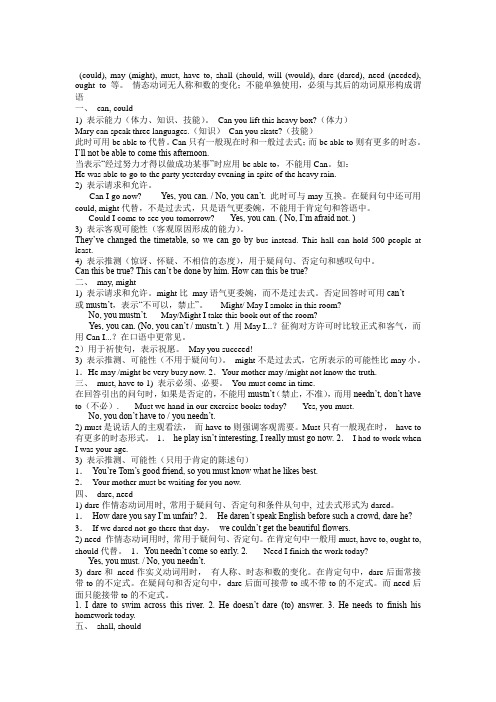
(could), may (might), must, have to, shall (should, will (would), dare (dared), need (needed), ought to等。
情态动词无人称和数的变化;不能单独使用,必须与其后的动词原形构成谓语一、can, could1) 表示能力(体力、知识、技能)。
Can you lift this heavy box?(体力)Mary can speak three languages.(知识)Can you skate?(技能)此时可用be able to代替。
Can只有一般现在时和一般过去式;而be able to则有更多的时态。
I’ll not be able to come this afternoon.当表示“经过努力才得以做成功某事”时应用be able to,不能用Can。
如:He was able to go to the party yesterday evening in spite of the heavy rain.2) 表示请求和允许。
-----Can I go now? ----- Yes, you can. / No, you can’t. 此时可与may互换。
在疑问句中还可用could, might代替,不是过去式,只是语气更委婉,不能用于肯定句和答语中。
---- Could I come to see you tomorrow? ---- Yes, you can. ( No, I’m afraid not. )3) 表示客观可能性(客观原因形成的能力)。
They’ve changed the timetable, so we can go by bus instead. This hall can hold 500 people at least.4) 表示推测(惊讶、怀疑、不相信的态度),用于疑问句、否定句和感叹句中。
七年级英语:情态动词专项练习带答案解析
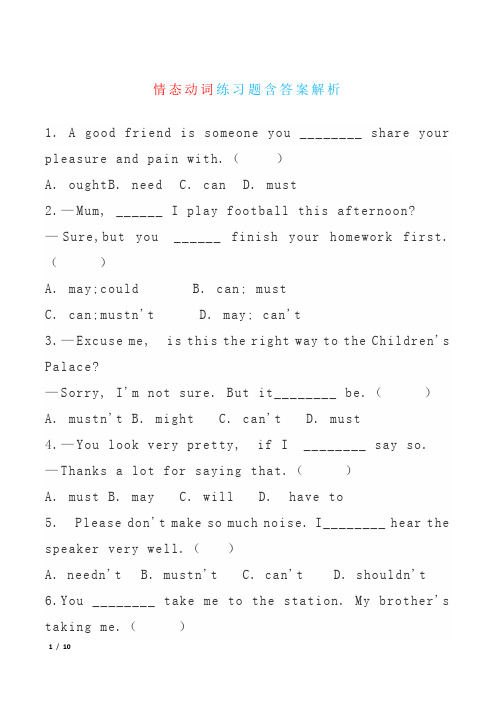
情态动词练习题含答案解析1. A good friend is someone you ________ share your pleasure and pain with.()A. oughtB. needC. canD. must2.—Mum, ______ I play football this afternoon?—Sure,but you ______ finish your homework first.()A. may;couldB. can; mustC. can;mustn'tD. may; can't3.—Excuse me, is this the right way to the Children's Palace?—Sorry, I'm not sure. But it________ be.()A. mustn'tB. mightC. can'tD. must4.—You look very pretty,if I ________ say so. —Thanks a lot for saying that.()A. mustB. mayC. willD. have to5. Please don't make so much noise. I________ hear the speaker very well.()A. needn'tB. mustn'tC. can'tD. shouldn't6.You ________ take me to the station. My brother's taking me.()A. can'tB. mustn'tC. shouldn'tD. don't have to7.—Mum, ________ I visit the Modern ArtMuseum next Monday?—I'm afraid you can't. All the museums in thiscity are closed on Monday.()A. wouldB. needC. shouldD. may8.We need clean air and water,so we ________ protect the environment.()A. canB. mayC. mustD. might9. —What should we do to protect the fish in the river?—We________ throw rubbish into the river.()A. needB. needn'tC. mustD. mustn't10.—What's wrong with Judy? She has been absent for two days.—Oh, she_____ be ill. Let's go to ask Mr. Green.()A. mayB. needC. would11.—We've got everything ready for the picnic.—Do you mean I______ bring anything with me?()A. can't B. mustn't C. couldn't D. needn't12.—Excuse me, ________ I take the magazine out of the reading room?—Sorry, you can't. Just here, please.()A. mustB. wouldC. mayD. need13.Rock music ___ sound popular with the young,but it's not the favor of the aged people.()A. mustB. needC. shouldD. may14.—Must I wait here all morning? I have a lot of work to do.—No, you____. You may be back in the afternoon.()A. mustn'tB. can'tC. don't have to15.The passengers ______ show their ID cards before getting on the plane.()A. mightB. mustC. could16. —Finally, they came back.—They_____ be hungry after such a long walk.()A. can'tB. mustC. needn't17. —I still haven't found my pet dog.—I'm sorry to hear that. You_____ be very sad.()A. canB. shouldC. mustD. will18. —Look at the young lady in red. Is it Mrs.Li?—No. It________ be her. She is wearing a white dress today.()A. mustn'tB. needn'tC. can't19. —Is that man Mr.Zhang?—It________ be him. He went to Beijing for a meeting yesterday.()A. can'tB. mustn'tC. needn't20. The girl in the classroom ________ be Sarah. She has gone to the library.()A. mayB. mustC. can'tD. needn't21. —Whose bike is this?—I am not sure. It ________ be Mary's.()A. shallB. mustC. might22. —Where are you going this month?—We________ go to Xiamen,but we're not sure.()A. needn'tB. mightC. mustD. mustn't23. —Is Tom coming by train?—He________ drive his car,I'm not sure.()A.can't B. may C. Must解析答案句意:一个好朋友就是和你一起分享你的快乐和悲伤的人。
初中英语情态动词讲解-练习及答案
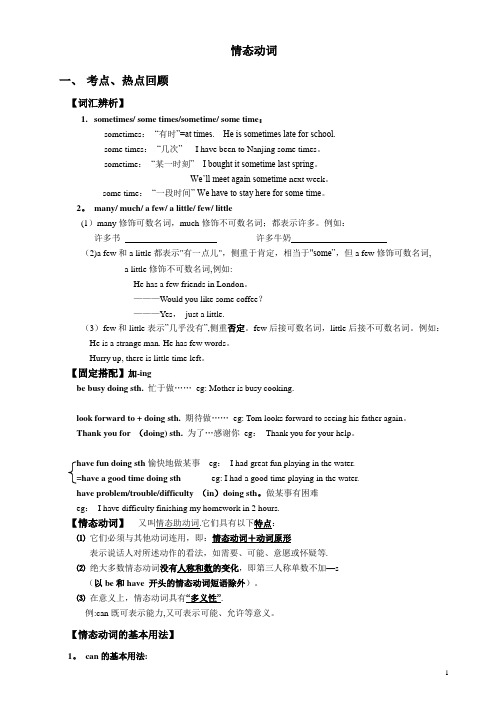
情态动词一、考点、热点回顾【词汇辨析】1.sometimes/ some times/sometime/ some time:sometimes:“有时”=at times. He is sometimes late for school.some times:“几次” I have been to Nanjing some times。
sometime:“某一时刻” I bought it sometime last spring。
We’ll meet again sometime next week。
some time:“一段时间” We have to stay here for some time。
2。
many/ much/ a few/ a little/ few/ little(1)many修饰可数名词,much修饰不可数名词;都表示许多。
例如:许多书许多牛奶(2)a few和a little都表示"有一点儿",侧重于肯定,相当于"some”,但a few修饰可数名词,a little修饰不可数名词,例如:He has a few friends in London。
———Would you like some coffee?———Yes,just a little.(3)few和little表示”几乎没有”,侧重否定。
few后接可数名词,little后接不可数名词。
例如:He is a strange man. He has few words。
Hurry up, there is little time left。
【固定搭配】加-ingbe busy doing sth.忙于做……eg: Mother is busy cooking.look forward to + doing sth. 期待做……eg: Tom looks forward to seeing his father again。
- 1、下载文档前请自行甄别文档内容的完整性,平台不提供额外的编辑、内容补充、找答案等附加服务。
- 2、"仅部分预览"的文档,不可在线预览部分如存在完整性等问题,可反馈申请退款(可完整预览的文档不适用该条件!)。
- 3、如文档侵犯您的权益,请联系客服反馈,我们会尽快为您处理(人工客服工作时间:9:00-18:30)。
(could), may (might), must, have to, shall (should, will (would), dare (dared), need (needed), ought to等。
情态动词无人称和数的变化;不能单独使用,必须与其后的动词原形构成谓语一、 can, could1) 表示能力(体力、知识、技能)。
Can you lift this heavy box?(体力)Mary can speak three languages.(知识) Can you skate?(技能)此时可用be able to代替。
Can只有一般现在时和一般过去式;而be able to则有更多的时态。
I’ll not be able to come this afternoon.当表示“经过努力才得以做成功某事”时应用be able to,不能用Can。
如:He was able to go to the party yesterday evening in spite of the heavy rain.2) 表示请求和允许。
-----Can I go now? ----- Yes, you can. / No, you can’t. 此时可与may互换。
在疑问句中还可用could, might代替,不是过去式,只是语气更委婉,不能用于肯定句和答语中。
---- Could I come to see you tomorrow? ---- Yes, you can. ( No, I’m afraid not. )3) 表示客观可能性(客观原因形成的能力)。
They’ve changed the timetable, so we can go by bus instead. This hall can hold 500 people at least.4) 表示推测(惊讶、怀疑、不相信的态度),用于疑问句、否定句和感叹句中。
Can this be true? This can’t be done by him. How can this be true?二、 may, might1) 表示请求和允许。
might比 may语气更委婉,而不是过去式。
否定回答时可用can’t或mustn’t,表示“不可以,禁止”。
---Might/ May I smoke in this room?---- No, you mustn’t. --- May/Might I take this book out of the room?---- Yes, you can. (No, you can’t / mustn’t. ) 用May I...?征徇对方许可时比较正式和客气,而用Can I...?在口语中更常见。
2)用于祈使句,表示祝愿。
May you succeed!3) 表示推测、可能性(不用于疑问句)。
might不是过去式,它所表示的可能性比may 小。
1.He may /might be very busy now. 2.Your mother may /might not know the truth.三、 must, have to 1) 表示必须、必要。
You must come in time.在回答引出的问句时,如果是否定的,不能用mustn’t(禁止,不准),而用needn’t, don’t have to(不必). ---- Must we hand in our exercise books today? ---- Yes, you must.---- No, you don’t have to / you needn’t.2) must是说话人的主观看法,而have to则强调客观需要。
Must只有一般现在时, have to 有更多的时态形式。
1.he play isn’t interesting, I really must go now. 2. I had to work whenI was your age.3) 表示推测、可能性(只用于肯定的陈述句)1.You’re Tom’s good friend, so you must know what he likes best.2. Your mother must be waiting for you now.四、 dare, need1) dare作情态动词用时, 常用于疑问句、否定句和条件从句中, 过去式形式为dared。
1.How dare you say I’m unfair? 2.He daren’t speak English before such a crowd, dare he? 3. If we dared not go there that day,we couldn’t get the beautiful flowers.2) need 作情态动词用时, 常用于疑问句、否定句。
在肯定句中一般用must, have to, ought to, should代替。
1.You needn’t come so early. 2. ---- Need I finish the work today?---- Yes, you must. / No, you needn’t.3) dare和 need作实义动词用时,有人称、时态和数的变化。
在肯定句中,dare后面常接带to的不定式。
在疑问句和否定句中,dare后面可接带to或不带to的不定式。
而need后面只能接带to的不定式。
1. I dare to swim across this river.2. He doesn’t dare (to) answer.3. He needs to finish his homework today.五、 shall, should1) shall 用于第一人称,征求对方的意见。
What shall we do this evening?2) shall 用于第二、三人称,表示说话人给对方的命令、警告、允诺或威胁。
1. You shall fail if you don’t work hard.(警告)2. He shall have the book when I finish it.(允诺)3. He shall be punished.(威胁)六、 will, would1) 表示请求、建议等,would更委婉。
Will / Would you pass me the ball, please?2) 表示意志、愿望和决心。
1. I will never do that again. 2. They asked him if he would go abroad.3) would表示过去反复发生的动作或某种倾向。
would表示过去习惯时比used to正式,且有“现已无此习惯”的含义。
1. During the vacation, he would visit me every other day. 2. The wound would not heal.4) 表示估计和猜想。
It would be about ten o’clock when she left home.七、 should, ought to 1) should, ought to表示“应该”,ought to表示义务或责任,比should语气重。
1. I should help her because she is in trouble. 2. You ought to take care of the baby.2) 表示劝告、建议和命令。
should, ought to可通用,但在疑问句中常用should。
1. You should / ought to go to class right away.2. Should I open the window?3) 表示推测should , ought to (客观推测), must(主观推测)。
1.He must be home by now. (断定他已到家) 2.He ought to/should be home by now.(不太肯定) 3. This is where the oil must be.(直爽)4. This is where the oil ought to/should be.(含蓄)情态动词 can 表示能力,意为“能会”表示推测,意为“可能”,常用于否定句和疑问句中表示请求,允许,意为“可以”could can 的过去式,意为“能、会”,表示过去的能力在疑问句中表示委婉请求may 表示请求、许可,意为“可以”表示推测,常用于肯定句中,意为“可能、也许”might may的过去式表示推测,常用于肯定句中,意为“ 可能、也许”must 表示主观看法,意为“必须、应该”表示有把握的推测,用语肯定句Need 表示需要、必须,主要用于否定句和疑问句中dare 表示敢于,主要用于否定句和疑问句中should 意为“ 应该”,表示要求和命令表示劝告、建议had better 意为“最好”,表示建议used to 意为“过去常常,表示过去的动作、行为考点知识清单知识梳理情态动词有具体的词义,但也同助动词一样,需要与其他词语一起构成句子的谓语,另外情态动词没哟人称和数的变化,情态动词后必须跟动词原形。
考点一 can ,may, must 等情态动词在陈述句中的用法1. can 的用法(1)表示能力、许可、可能性。
表示能力时一般译为“能、会”,即有种能力,尤其是生来具备的能力,此时may 和must 均不可代替它。
如:She can swim fast, but I can’t .她能游得很快,但我不能。
I can see with my eyes. 我用眼睛看。
(2)表示可能、能够。
如:I can finish it in an hour. 我能在一小时后完成它。
(3)表示许可,常在口语中。
如:You can use my dictionary. 你可以用我的字典。
(4)表示推测,意为“可能”,常用于否定句和疑问句中,此时can’t 译为“ 不可能”。
如:Can the news be true? 这个消息会是真的吗?----Can it be our teacher?那个人有可能是我们老师吗?----No, it can’t be our teacher. He is on a visit to the Great Wall.不可能。
